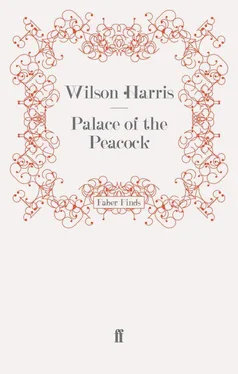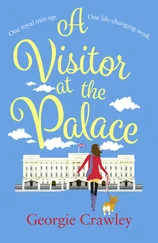Wilson Harris - Palace of the Peacock
Здесь есть возможность читать онлайн «Wilson Harris - Palace of the Peacock» весь текст электронной книги совершенно бесплатно (целиком полную версию без сокращений). В некоторых случаях можно слушать аудио, скачать через торрент в формате fb2 и присутствует краткое содержание. Год выпуска: 2013, Издательство: Faber Finds, Жанр: Современная проза, на английском языке. Описание произведения, (предисловие) а так же отзывы посетителей доступны на портале библиотеки ЛибКат.
- Название:Palace of the Peacock
- Автор:
- Издательство:Faber Finds
- Жанр:
- Год:2013
- ISBN:нет данных
- Рейтинг книги:5 / 5. Голосов: 1
-
Избранное:Добавить в избранное
- Отзывы:
-
Ваша оценка:
- 100
- 1
- 2
- 3
- 4
- 5
Palace of the Peacock: краткое содержание, описание и аннотация
Предлагаем к чтению аннотацию, описание, краткое содержание или предисловие (зависит от того, что написал сам автор книги «Palace of the Peacock»). Если вы не нашли необходимую информацию о книге — напишите в комментариях, мы постараемся отыскать её.
Palace of the Peacock — читать онлайн бесплатно полную книгу (весь текст) целиком
Ниже представлен текст книги, разбитый по страницам. Система сохранения места последней прочитанной страницы, позволяет с удобством читать онлайн бесплатно книгу «Palace of the Peacock», без необходимости каждый раз заново искать на чём Вы остановились. Поставьте закладку, и сможете в любой момент перейти на страницу, на которой закончили чтение.
Интервал:
Закладка:
But Donne is not alone. The dreamer notices a frightening resemblance between Donne and Donne’s understudy, the bowman Wishrop, especially when the two are standing side by side. Almost at the same time, however, the Dreamer’s heart comes into his mouth because he is certain Donne was “myself standing outside of me while I stood inside of him”. As the book unfolds and spirals all the characters seem to be facets or aspects of Donne; at the same time, every character seems to be a Donne in his own right. We know from the start that Donne and the dreamer are brothers or halves of the same person.
So if we concentrate on Donne and follow his story we can’t lose too much about the novel as a whole, and we stay constantly in tune with the ways in which the novel uses the convention of the individual character only to undermine it. More than any other Harris novel, this one uses all the conventions of the novel to undermine the conventions of the novel. A sense of place, a sense of history, recognisable characters, the language of ordinary people and linear structure are similarly treated. The ghosts of all of these devices serve necessary functions, but the book pretends not to need them. And ultimately doesn’t.
Harris’s work is one long endeavour to shake our complacent investment in our conditioned reality and especially the notion that the individual in “real life” is or can be self-sufficient. The human subject is not separate from other people, past, present and future. The human subject is haunted by ghosts resident in this place and in other places. He does not have an identity sealed off from other species or from the life of nature.
But listen to Donne’s thundering and you hear the gun-talk of a Caribbean familiar: “I tell you I fight everything in nature — flood, drought, chicken hawk, rat, beast and woman. I’m everything. Midwife, yes, doctor, yes, gaoler, judge, hangman, every blasted thing to the labouring people.” Donne utters this robber-talk when the Dreamer upbraids him for his exploitation of the folk and his abuse of the woman Mariella. Donne reminds his brother that life in an outpost of progress is tough. Once you have yielded to the heart of darkness that is imperial and colonial exploitation, you have to be a devil to survive.
Like many people who have had it hard, Donne has taken survival beyond the boundary and turned the quest for power and material security into a permanent cloak or bullet-proof vest. His immigrant parents were farmers and hand-to-mouth business folk. They had had a hard life in the colony. When they died young, the forced-ripe Donne was obliged to take care of his brother the Dreamer.
But there is a fire in Donne that the increasingly timid, repressed and decent Dreamer longed to accommodate even as a child. A native of the Dreamer’s person, in fact, that would not accept the sentence and censure of education into self-control. Until Donne got himself expelled from school and joined up with a team of ranchers in the border country. “I had a curious sense of hard-won freedom when you had gone,” the Dreamer tells Donne. But the obsession never leaves him, and that is why he has come to the house Donne has constructed in the savannahs, the house from which he burned to rule the world.
Harris’s scrupulous tracing of the stages by which Donne entangles himself in the kingdom of this world holds the novel together, gives it recognisable reality. It is not difficult to understand Donne’s project to gain the whole world. It is the obsession of immigrants, men who come with nothing and think they are nothing.
Today men are buying up the island of Tobago, buying up Blanchisseuse, buying up Matura and other profitable choice sites in all the islands. Taking over banks. Rearing tourism hotels. Accumulating property to rent to embassies and foreign investors. Building access roads to plunder the land. It is the con-man version, the service-industry version, the insider-trading version, decadent forms of creativity, sad substitutes for the pioneering energy of a Donne or for the entrepreneurial spirit that took risks and built America. Palace of the Peacock understands the perils facing exploiter and exploited in the past and now.
Donne is bold-faced and brazen with his materialism: “‘Now I’m a man. I’ve learnt‚’ he waved his hands at the savannahs, ‘to rule this. This is the ultimate. This is everlasting. One doesn’t have to see deeper than that, does one?’ He stared at me hard as death. ‘Rule the land‚’ he said, ‘while you still have a ghost of a chance. And you rule the world. Look at the sun.’ His dead eye blinded mine. ‘Look at the sun‚’ he cried in a stamping terrible voice.” Donne thinks he is fighting his way out of the economic nightmare that killed off his parents before they had a chance to live. He disputes that “these devils” (the Amerindians) have title to the savannahs and the region. “‘After all, I’ve earned a right here as well. I’m as native as they, ain’t I?’”
The Dreamer is repelled and fascinated by Donne’s fierce and uninhibited energy. The novel celebrates this energy and juxtaposes the amoral Donne with the Churchy, frustrated Dreamer. But it is not a case of Donne being evil and the Dreamer good. Better to be Donne or Sutpen or Faust than the Dreamer, actually. Donne, at least, is living!
Donne has several moments where he expresses misgivings about having become “the most violent taskmaster” and of being involved in “the most frightful material slavery”. He confesses that he drives himself “with no hope of redemption whatsoever” and would not be surprised if the Indians do him in. For a moment at any rate, he longs for release.
Harris uses the figure of Donne to present man in the rich welter of his material obsessions and spiritual drives, and to bring the reader closer to harmonising these. It is not necessary to worry about whether Donne is alive or saved at the end. And it is not fair to ask Harris to write a novel in which the characters live as ordinary people who have internalised the novels’ “vision of consciousness”. What happens to the figures in the novels happens for the reader’s benefit. It is the reader who becomes the characters. The characters can go hang when they are done. Donne is shot or hanged by Mariella.
Towards the end of Palace of the Peacock , Harris tries to write about how beautiful heaven can be. Donne and his crew come to the highest waterfall they have ever seen. Astonished at “the immaculate bridal veil falling motionlessly from the river’s tall brink”, they abandon their boat and engine and begin ascending the cliff, mounting the steps and balconies that have been nailed with abandon from bottom to top. Donne comes to a window in the cliff and his eyes take in a vision of eternity in the glistening shimmering form of ancient everlasting mother and child. This is Harris describing the eternal with tranquillity and passion together. This is Harris trying to write about what happens in heaven. But you can’t look upon the glory of the Lord and escape unscathed. See what happens to the fierce conquistador: “Donne knew he was truly blind now at last. He saw nothing. The burning pain he felt suddenly in his eye extended down his face and along the column of his neck until it branched into nerves and limbs. His teeth loosened in their sockets and he moved his tongue gingerly along them. He trembled as he saw himself inwardly melting into nothingness and into the body of his death. He kept sliding on the slippery moss of the cliff and along columns and grease and mud. A singular thought always secured him to the scaffolding. It was the unflinching clarity with which he looked into himself and saw that all his life he had loved no one but himself.”
This is a dangerous passage because it could be used to reduce the book to a vulgar morality tale. The dissolution of the material Donne is not the climax but a preliminary stage. Harris is the first deconstructionist. But Caribbean deconstruction was never negative or cynical. All colonials have to deconstruct. All those people telling you who you are. People trying to Other you. The Secret Ladder describes in the clearest of terms the beginning of the post-colonial process of casting off what has been imposed. Russell Fenwick realises he is not really going mad in the bush: “Seven days it had taken to finish the original veil of creation that shaped and ordered all things to be solid in the beginning. So the oldest fable ran. Perhaps seven too were needed to strip and subtilize everything … The seven beads of the original creation had been material days of efflorescence and bloom to distinguish their truly material character. But now the opposite realities of freedom were being chosen (not phenomena of efflorescence but shells and skeletons) to distinguish an immaterial constitution (which after all was the essential legitimacy of all creation).” That is what happens to Donne and the crew. The seven days up to Mariella are for deconstruction. The seven days after are days of re-construction.
Читать дальшеИнтервал:
Закладка:
Похожие книги на «Palace of the Peacock»
Представляем Вашему вниманию похожие книги на «Palace of the Peacock» списком для выбора. Мы отобрали схожую по названию и смыслу литературу в надежде предоставить читателям больше вариантов отыскать новые, интересные, ещё непрочитанные произведения.
Обсуждение, отзывы о книге «Palace of the Peacock» и просто собственные мнения читателей. Оставьте ваши комментарии, напишите, что Вы думаете о произведении, его смысле или главных героях. Укажите что конкретно понравилось, а что нет, и почему Вы так считаете.












